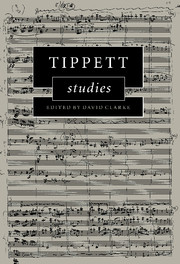Book contents
- Frontmatter
- Contents
- Preface
- References to Tippett's scores and essays
- 1 ‘Only half rebelling’: tonal strategies, folksong and ‘Englishness’ in Tippett's Concerto for Double String Orchestra
- 2 From pastiche to free composition: R. O. Morris, Tippett, and the development of pitch resources in the Fantasia Concertante on a Theme of Corelli
- 3 ‘Is there a choice at all?’ King Priam and motives for analysis
- 4 Tippett's Second Symphony, Stravinsky and the language of neoclassicism: towards a critical framework
- 5 Tippett, sequence and metaphor
- 6 Tonal elements and their significance in Tippett's Sonata No. 3 for Piano
- 7 ‘Significant gestures to the past’: formal processes and visionary moments in Tippett's Triple Concerto
- 8 Tippett's King Priam and ‘the tragic vision’
- 9 Tippett at the millennium: a personal memoir
- 10 Decline or renewal in late Tippett? The Fifth String Quartet in perspective
- Appendix: glossary of terms used in pitch-class set theory
- Index
10 - Decline or renewal in late Tippett? The Fifth String Quartet in perspective
Published online by Cambridge University Press: 22 September 2009
- Frontmatter
- Contents
- Preface
- References to Tippett's scores and essays
- 1 ‘Only half rebelling’: tonal strategies, folksong and ‘Englishness’ in Tippett's Concerto for Double String Orchestra
- 2 From pastiche to free composition: R. O. Morris, Tippett, and the development of pitch resources in the Fantasia Concertante on a Theme of Corelli
- 3 ‘Is there a choice at all?’ King Priam and motives for analysis
- 4 Tippett's Second Symphony, Stravinsky and the language of neoclassicism: towards a critical framework
- 5 Tippett, sequence and metaphor
- 6 Tonal elements and their significance in Tippett's Sonata No. 3 for Piano
- 7 ‘Significant gestures to the past’: formal processes and visionary moments in Tippett's Triple Concerto
- 8 Tippett's King Priam and ‘the tragic vision’
- 9 Tippett at the millennium: a personal memoir
- 10 Decline or renewal in late Tippett? The Fifth String Quartet in perspective
- Appendix: glossary of terms used in pitch-class set theory
- Index
Summary
I
Tippett had to endure much adverse criticism during his long career. Yet when the reception history of his music comes to be written it will be surprising if, among the more negative critiques of his work, there is any that quite matches Derrick Puffett's extraordinary article ‘Tippett and the retreat from mythology’ in terms of the sustained and forthright nature of its attack. Published in the month of the composer's ninetieth birthday, this highly personal polemic describes, against the background of the composer's own writings, some of the changes which Tippett's music and its reception have undergone over the years. Puffett, while strongly sympathetic to the earlier work (despite claims of technical miscalculation and misjudgement in questions of formal proportion), finds evidence of a ‘sad decline’ in the composer's musical and literary output that began some time after the composition of King Priam (1958–61). Tippett's abandonment of myth, the original inclusion of which is seen as key to the success of such works as The Midsummer Marriage (1946–52) and King Priam, and his subsequent failure – in Eliot's words – ‘to transmute his personal and private agonies into something rich and strange, something universal and impersonal’, are held to be at the root of this decline.
- Type
- Chapter
- Information
- Tippett Studies , pp. 200 - 222Publisher: Cambridge University PressPrint publication year: 1999
- 1
- Cited by



